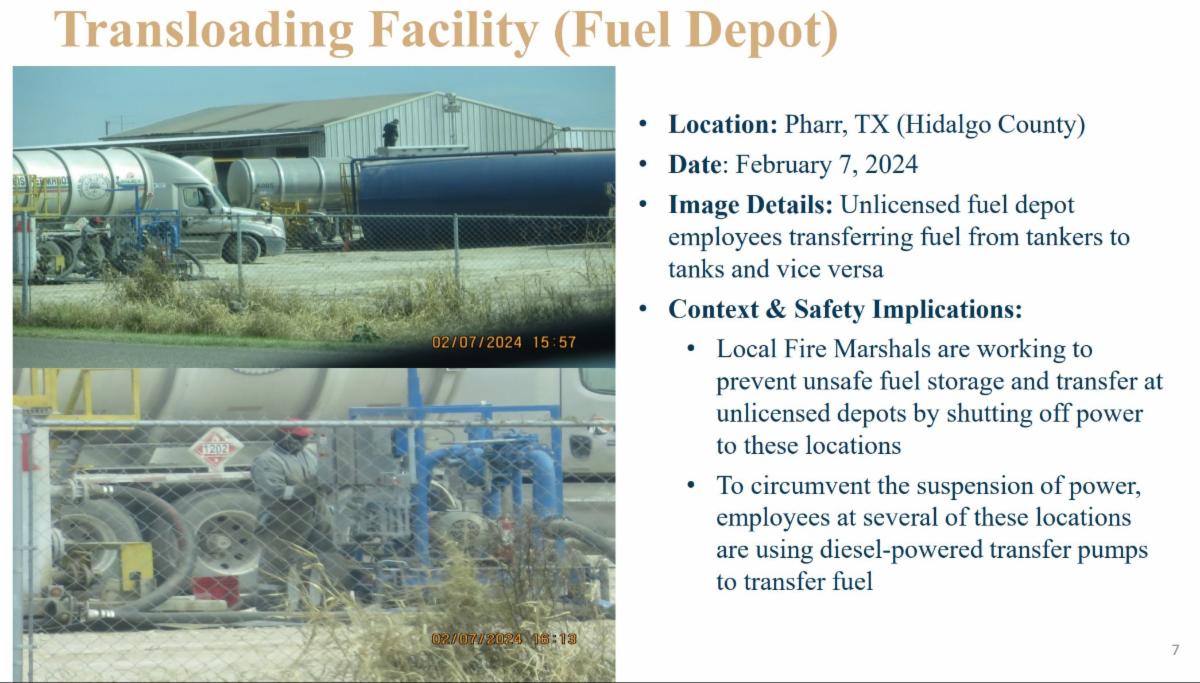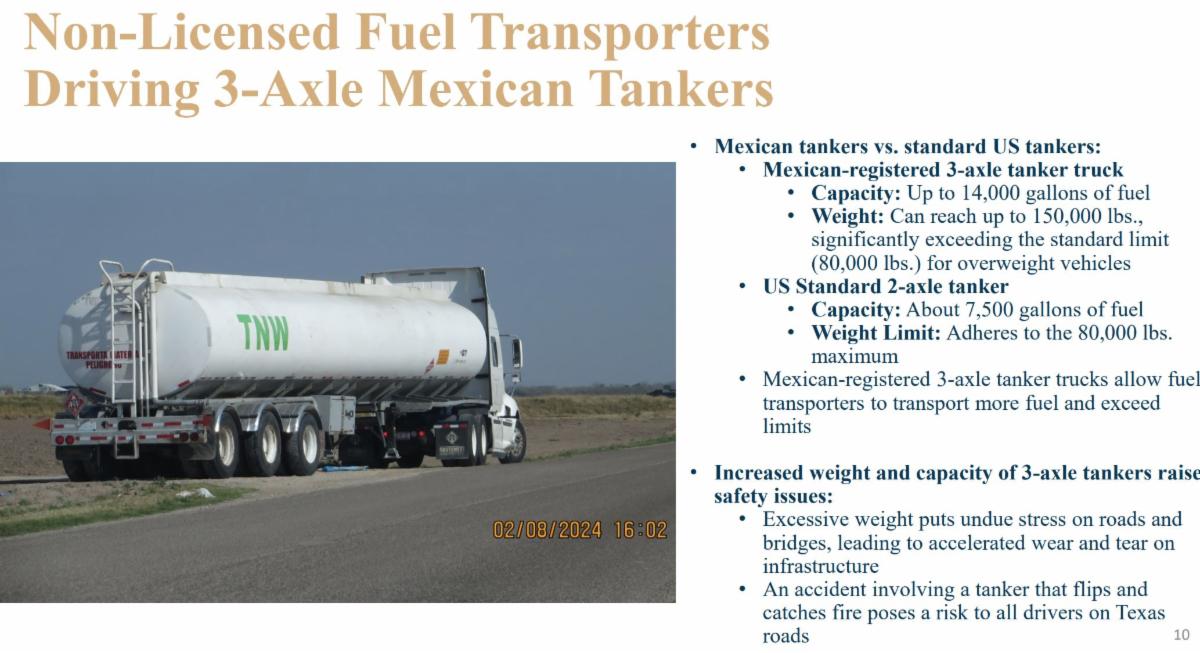Press Items: Senator Juan "Chuy" Hinojosa — District 20

May 17, 2025

When most Texans think about border crime, they picture drugs or weapons—not fuel. But in recent years, a different kind of smuggling has taken hold across the Texas-Mexico border: fuel theft and tax evasion through transloading operations, increasingly linked to Mexican cartels and enabled by unregulated fuel depots. In 2024, Lt. Governor Dan Patrick assigned the Senate Committee on Border Security to do a deep dive into this issue. What I learned is that this is not just a regional issue. It affects statewide tax integrity, environmental safety, and the security of our international trade routes.
During committee hearings the Texas Department of Public Safety (DPS) and the Comptrollers’s Criminal Investigation Division testified that what started as isolated schemes has evolved into a coordinated system to export fuel to Mexico without paying taxes. Known in Mexico as huachicol, the black-market fuel trade once referred to thefts from Pemex pipelines. But today, a new variant has emerged—huachicol fiscal—where fuel purchased tax-free in Texas is smuggled into Mexico, bypassing both U.S. and Mexican fuel tax systems.
Unregulated Fuel Depots: The Hidden Infrastructure of Huachicol
According to DPS and the Comptroller’s Office, these transloading facilities known as fuel depots operating near ports of entry and mostly connected by designated overweight corridors are the key for smuggling operations. Trucks carrying tax-free loads of fuel intended for export pull into nearby depots to shift fuel from U.S. trucks to Mexican tankers or offload it into above-ground storage tanks to manipulate load weights and bypass tax regulation. Fuel intended for export is often blended, resold, or smuggled across the border using false shipping documents and unlicensed transporters. The result: millions in lost tax revenue, increased environmental risks, and a black-market infrastructure that enables cartel-linked actors to profit at the state’s expense.
Many of the workers at these facilities are untrained in dealing with hazardous materials and use pumps, hoses, and other equipment not safe for the handling of fuel. DPS and the Comptroller’s Office reported that the use of overweight three-axle trucks to carry up to 140,000 pounds, far above the standard 80,000-pound limit, are an integral part of the scheme to get the fuel across to Mexico. While some trucks operate on permitted overweight corridors like the route from the Port of Harlingen to the Los Indios Bridge, many others illegally use roads not designated as overweight routes under state law leading to the Pharr International Bridge—posing serious safety and enforcement challenges. These activities are occurring in residential areas creating dangerous situations for our families.
Law enforcement reports show these operations routinely violate environmental and hazardous material laws. Spills seep into the soil. Fumes escape into neighborhoods. Some depots sit just blocks from schools, homes, and international bridges—turning border communities into staging grounds for cartel-linked fuel crime.
Federal Action and the Texas Response
This is not theoretical. On May 1, the U.S. Treasury’s Financial Crimes Enforcement Network (FinCEN) issued a warning about fuel smuggling operations run by Mexican cartels. These groups exploit our border infrastructure and weak regulations to move stolen crude oil into the United States, often disguised as waste oil shipments. Through American associates using shell companies appearing to be legitimate businesses in the fuel industry, the cartels are enabled to launder billions of dollars in illegal profits nationwide, harming our communities and economy.
Last month, four people were arrested in a crude oil smuggling case connected to a Rio Hondo facility. This followed months of investigations by federal agencies, DPS, and the Comptroller’s Criminal Investigation Division into tax fraud, illegal transloading, and unlicensed tanker operations in Cameron and Hidalgo Counties.
SB 2949: Closing the Loopholes, Protecting Texas
In response, I filed Senate Bill 2949, which passed the Senate unanimously last April and is now in the House. The purpose of this legislation is to shut down fuel depots in border counties, where the risk of smuggling and fraud is greatest. The bill establishes strong civil and criminal penalties, tightens motor fuel transporter licensing requirements, and enhances fuel export tracking, specifically targeting undocumented transloading, fraud, and illegal fuel transport. By improving state oversight, we can stop fuel tax evasion at the source and eradicate the infrastructure supporting illegal fuel trade.
What sets SB 2949 apart as passed in the Senate, is its clarity: it does not create new loopholes or regulatory confusion. It targets unregulated infrastructure while protecting lawful IRS-registered terminals, refineries, and exporters. It holds both the operator and the licensed supplier accountable for any misuse of tax-exempt fuel. And it gives state and local authorities the tools they need to shut down dangerous fuel depots.
What to Watch For
Texans should be alert for signs of this growing trade:
- Three-axle fuel trucks from Mexico using local roads not designated for overweight travel.
- Above-ground tanks on vacant lots or near ports of entry with no visible signage or safety barriers.
- Frequent fuel transfers between trucks using hoses and portable pumps without proper documentation.
- These are not harmless logistics hubs—they are hubs for tax fraud, smuggling, and criminal activity.
The Stakes
We cannot allow cartel-linked fuel crime to take root on Texas soil. The economic impact is real, the public safety risks are rising, and the credibility of our tax system is on the line. SB 2949 strikes the right balance: strong enforcement, protection for legitimate commerce, and a clear message that Texas will not tolerate black-market fuel routes—northbound or southbound. Texas cannot compromise its security or lawful commerce in the face of this growing threat. We must work together to fight against huachicol (fuel theft) and huachicol fiscal (tax evasion) to work toward a safer future for our communities.



###

